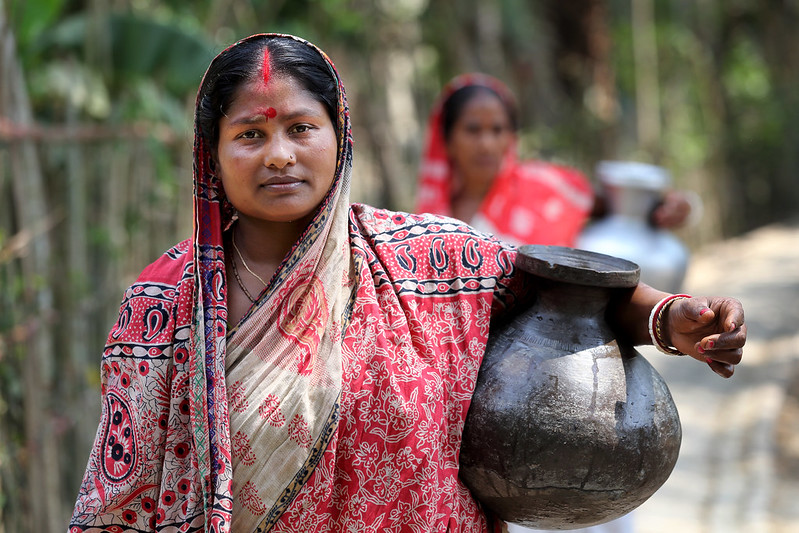In 2018, Dr. Moby Kazmi, a successful entrepreneur and co-founder of CareMed Specialty Pharmacy, founded CoPilot Cares, the philanthropic arm of CoPilot Provider Support Services.
The organization is focused on a variety of national and global philanthropic efforts.
One of CoPilot Cares’ key investments is the installation of hand pumps to provide clean drinking water where access is lacking. CoPilot Cares has installed over two hundred hand pumps in India, Bangladesh, Pakistan, and Sri Lanka, providing a basic human right and a vital natural resource to underserved communities.

Photo by M. Yousuf Tushar.
On average, women and girls in developing countries walk approximately six kilometers (approximately 3.5 miles) every day, carrying twenty liters (approximately 42 pounds/20 kgs) of water. In some underdeveloped communities, it is not uncommon for this journey to take over fifteen hours every week.
In the United States, the richest nation in the world, we don’t usually think much about water. There are, of course, the occasional drought and water use restrictions that create a temporary inconvenience. We may also sometimes feel the impact of water waste when we receive the water bill, but for most Americans, waste is a luxury of wealth and privilege. The monthly bill is a price we are more than willing to pay for an extended shower or a well-manicured golf course.
The Environmental Protection Agency (EPA) estimates that Americans waste approximately one trillion gallons of water annually. It’s nearly impossible to visualize a number that large, but imagine 48 billion full bathtubs, and you have the beginning of an idea about how much water is needlessly wasted in this country because of leaky kitchen and bathroom faucets, faulty toilets, and inefficient water sprinkler systems and lawn care.
In most of the rest of the world, absent, inadequate, or inappropriately managed water and sanitation systems are a matter of life and death. Safe water, sanitation, and hygiene are among the most basic requirements for human health.
According to the World Health Organization (WHO), 2.1 billion people around the world lack access to safe, readily available water at home. 844 million people do not have basic drinking water services. 263 million people have to spend over 30 minutes per trip collecting water from sources outside the home. 159 million people still drink untreated water from surface water sources, such as streams or lakes.
“It is very easy to feel overwhelmed by big problems that affect hundreds of millions of people and think there is nothing to be done. I have always thought that despite the size of a problem, I must do something,” says Kazmi.
Contaminated water and poor sanitation impact the transmission of communicable diseases such as cholera, diarrhea, dysentery, hepatitis A, polio, and typhoid. A lack of adequate water and sanitation services exposes individuals to preventable health risks.
In healthcare and medical facilities, patients and staff are at significant additional risk of infection and disease when water, sanitation, and hygiene services are deficient. These risks have become especially evident during the current pandemic when widespread contagion can be mitigated with easier access to water resources and better hygiene.
Climate change, increasing water scarcity, rapid population growth, demographic changes, and increased urbanization are posing formidable challenges even for affluent societies with well-developed water supply systems. In underdeveloped countries, 22 percent of health care facilities have no water service, 21 percent have no sanitation service, and 22 percent have no waste management service.
Kazmi is not one to be easily intimidated by big numbers or big problems. “The idea of looking at seemingly insurmountable challenges and seeking solutions has been a motivating factor for me throughout my entire life,” explains Kazmi. “It was this philosophy that propelled me to launch CareMed Specialty Pharmacy, my first large-scale entrepreneurship opportunity.”
As a doctor, Kazmi has always had a keen understanding of how little changes can make a big difference. During his early years at CareMed, he found that his competitors would not offer Saturday or Sunday deliveries. He thought that was crazy, particularly because they were dealing with specialty pharmaceuticals that terminally ill patients needed right away.
However, as the founder of a bootstrap startup, he also could not really afford to pay extra for a driver to make weekend deliveries… so he got in the car and did deliveries himself, at least until CareMed started to turn a profit.
It didn’t take long. CareMed quickly became one of the nation’s fastest-growing, privately held companies and was recognized by Inc. Magazine. PharMerica, a leading provider of pharmacy services, acquired CareMed in March 2017, enabling Kazmi to spend more time on philanthropy and helping those less fortunate.
“With our hand pump initiative, we are able to empower underserved communities across the globe by providing the means to improve the quality of their lives and their social and economic prospects. We all have the opportunity to make a difference, one drop at a time.”


